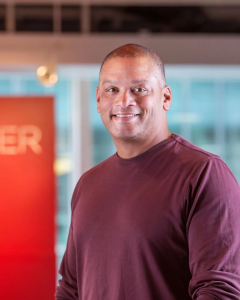Jack Rives, who stepped down as executive director of the American Bar Association last February after 12 years in that role, has joined the legal services company Rocket Lawyer as president of a new business unit, Rocket Legal Professional Services, where he is now leading the company’s expansion of its delivery of more-affordable legal services through lawyers and legal professionals.
He will also oversee the company’s alternative business structure initiatives in the UK and as part of the Utah regulatory sandbox, seek ABS designation in Arizona, and play a key role in executing Rocket Lawyer’s plans to use artificial intelligence to accelerate lawyer productivity.
“His experience, along with the Rocket Lawyer natively digital legal services platform will rapidly scale the availability, responsiveness and affordability of qualified legal practitioners everywhere,” the company said in announcing the hire.
Ironically, while at the ABA, Rives spearheaded a partnership with Rocket Lawyer to launch ABA Law Connect, a test program of legal services for small business in three states. Under the program, small businesses could be connected with ABA member lawyers to ask legal questions for a fee of $4.95.
But just three months after launching the pilot program, the ABA shut it down, in response to vocal opposition from state and local bar associations, some of which claimed the program would take away business from their own lawyer referral services.
Do Something Meaningful
It was through that partnership that Rives came to know Rocket Lawyer’s founder and CEO Charley Moore, and after Rives left the ABA and was exploring his options, Moore offered him the opportunity to take on this new role.
Listen: On LawNext: Rocket Lawyer Founder Charley Moore.
“When I left the American Bar Association, I wanted to do something that would be meaningful and have challenges, and this position certainly is both of those,” Rives told me during an interview Tuesday.
Before joining the ABA in 2010, Rives was a judge advocate in the U.S. Air Force for 33 years. He was the acting Judge Advocate General of the Air Force from 2004 to 2006 and then Judge Advocate General until 2010. He was the first military attorney to attain the three-star rank of lieutenant general.
In that role, he came to appreciate how the military makes it easy for members, their families and retirees to access legal services, he told me. His time at the ABA helped him understand the challenges of similarly enhancing access to justice and making the law affordable and simple on a broader basis.
“Like me, Jack saw first-hand how much of a game changer access to a legal professional can be, when access is provided as a benefit,” Moore said in a statement. “His passion for promoting access to justice and improving the legal profession aligns seamlessly with Rocket Lawyer core values. We are excited to have him join our team.”
Expand Access to Lawyers
At Rocket Lawyer, he will be working to expand the number of lawyers it works with to deliver legal services as well as working to expand their capacity through technology and AI.
Rocket Lawyer is already licensed as an ABS in the U.K. and it was the first national company approved to operate under Utah’s regulatory sandbox, meaning it can directly employ lawyers in those jurisdictions.
It already has an extensive network of independent lawyers it works with through the United States.
Now, Rocket Lawyer will seek to be licensed as an ABS in Arizona, both to provide legal services directly in Arizona, and also with an eye to creating an operation there that will help the company build up its capacity to service clients elsewhere and develop operations for more effectively serving its clients.
“If I’m going to help a client in Oregon, I need to be licensed in Oregon,” Rives said. “But we’re also going to be looking at other possibilities that may present themselves to further advance the law in this area.”
“The ethical restrictions and professional responsibility rules were written decades ago. Is that really what we need in today’s world? … The law is conservative and it moves slowly, but there’s no question that technology has changed and the world is changing.”
AI to Enhance Capacity
Rocket Lawyer is also developing AI to enhance lawyers’ capacity to deliver legal help. “We’re going to be able to leverage an AI-hybrid model that’ll permit the lawyers to really focus on the higher level and the strategic work that only attorneys can do.”
As an example, he said that Rocket Lawyer’s AI will help users define the nature of their legal problem, saving the lawyer time otherwise spent refining the issue.
“A Rocket Lawyer member may believe they have a real estate problem, and as the generative AI helps define the issue, we find out it really is a tax problem at root.”
He expects that generative AI will also be able to generate the initial response to the client’s problem, subject to the lawyer’s review and editing. “But again, that saves the human element the time and saves the lawyer for what they’re best trained to do.”
Rives said that the ultimate goal of the new Rocket Legal Professional Services is to expand Rocket Lawyer’s network of attorneys so that it can be immediately responsive to consumers’ legal needs.
“Rocket Lawyer is proud of its responsiveness now, but what we intend to do is be that much more responsive. If you have an online question, we can respond really quickly. If you want to connect with a lawyer, we can connect you with a lawyer quickly.
“The AI will help us define the issues better and get started on the legal response, but it’s going to be the human element that will enable us to move forward most effectively.”
A Changing World
I asked Rives if Rocket Lawyer will be involved in lobbying for other states to adopt rule changes such as Arizona and Utah have done. He said that, while it may not be engaging in formal lobbying, it will be continuing to advocate for change “because we believe it’s important for the profession to move forward.”
“Everyone knows the world is changing. When I would talk to lawyers when I was at the American Bar Association and I would talk about change, everyone was all for change unless it affected them. Okay, well it’s going to affect you. It’s going to be a different world, and you can adapt to it.”
Of the organization he formerly ran, he said, “The American Bar Association needs to either lead or the ABA is going to wonder what happened. And the ABA still has time and still has the capability of leading in that area.”
Rocket Lawyer, by contrast, “wants to get the word out … we need to make the law more affordable, we need to make access to law simplified, we need to expand access to justice.”
Access to Justice Is Key
Although Rives had not previously spoken publicly about why he left the ABA, he told me that, when he took the ABA job, he never intended it to be his last, and that he had given the ABA leadership a year’s notice of his intent to leave after the midyear meeting in February. And although he considered other opportunism after leaving the ABA, Rocket Lawyer was the most appealing.
“This really is the next step of what I’ve been working on throughout my professional life, beginning in the military and then at the ABA. Rocket lawyer has a really good model. They want lawyers.”
In contrast to some companies that are pushing for people to practice law without a license, he said, “Rocket Lawyer wants people to understand you do need a lawyer. And we want to make them as accessible as possible. We want to make the process simple.”
“Access to justice really is key. And when we do it the right way, the public will benefit and the legal profession will benefit.”
 Robert Ambrogi Blog
Robert Ambrogi Blog
